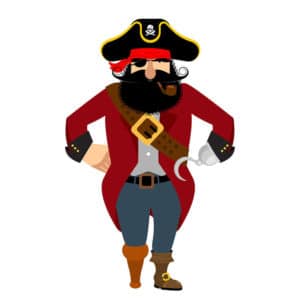Pirate 2.0: Fighting Software And Digital Media Piracy
-

Aaron Gray
-
 April 27 , 2023
April 27 , 2023 -
 4 min read
4 min read
Pirate 2.0 was an update on the Digital Millennium Copyright Act filter, which was initially launched in 2012. The improvements rolled out in October 2014 to devalue pirate sites such as torrent directories and the like in the SERPs. It mainly focused on fighting software and digital media piracy.
What’s It For
The Pirate algorithm was developed to address the issue of piracy. The 2.0 update fine-tuned the signals that the search engine used to detect websites that violated the DMCA and devalue them from the SERPs. The demotion still depended on the valid takedown requests that a domain receives along with other unannounced factors.

However, flagged pages won’t be delisted; only ranked down the results pages. This change makes legitimate and high-quality sources of digital media more visible to users.
These are Google’s anti-piracy principles:
- Offering Better Legitimate Alternatives The team believes that the issue of piracy can be solved by providing more legitimate alternatives to users. These options should be better and more accessible to give the most value for consumers while driving in revenue for the creative industry as a whole.
- Eliminating Rogue Sites at the Source With Google AdSense, the search engine can figure out which websites capitalize on their advertising and payment services. They work on the logical implication that rogue sites are commercial ventures and that cutting off the money supply of these domains will make them cease their operations entirely.
- Investing in Improving Anti-Piracy Solutions Google continues to devote a portion of their resources to develop and improve on anti-piracy solutions. One of which is the more efficient way of processing copyright removal requests. At the time of Pirate 2.0’s release, the team was able to take action on millions of takedowns per week with less than six hours of turnaround time.
- Detecting False Piracy Allegations The search engine also knows that some people will abuse this privilege and fabricate copyright infringement reports against their competitors. Google has put up measures that will correctly evaluate and reject bogus allegations.
- Promoting Transparency through Public Reports The team created a site where they publish the data for copyright removals. You can find information such as the number of links requested to be removed, domains, copyright owners who reported an infringement, and reporting organizations.
What Were Its Effects
Torrent sites got a significant hit with the demotion system of the Pirate 2.0 update. Isohunt.to, 4shared, Filestube, and Dilandau lost organic traffic after the changes rolled out. Autocomplete suggestions and keywords that direct users to this type of websites were also censored such as “download,” “watch,” and “torrent.”
Meanwhile, Torrent Freak reported that The Pirate Bay, a prominent torrent site, wasn’t worried about this development since most of their users don’t come from the search engine. They actually believe that more people will visit their website directly.
Moreover, IsoHunt’s Gary Fung noted that YouTube probably was exempted from the demotion even when the platform has also received a considerable amount of takedown requests. He mentioned that it didn’t seem to promote fair competition for similar channels.
What It Means for You
Pirate 2.0 is a pretty significant update, but also very specific. It only targeted websites that explicitly promoted pirated content such as torrent sites. Generally, most webmasters didn’t feel any impact on their rankings unless they scraped content from other sources.
Google has since been more stringent in ensuring that content and the revenue that it entails are credited to the creators themselves instead of pirates. If you’ve been doing ethical practices with this, you don’t have to worry.
One legitimate concern arose from sites that hosted user-generated content. What you can do is to designate a DMCA agent which helps you monitor copyright removal requests. This service is essential nowadays since you can’t claim protection if pirated content is posted on your domain whether or not you knew it was published; even something as seemingly inconsequential as a brand logo in the comments section can be a liability to your website.
If you haven’t done so already, you should also create an account with Google Webmaster Tools to get support for your website. The service has a feature that alerts you to any takedown requests filed against your site and prepares for counter-notices if necessary.
The inability to file a counter against infringement allegations when you aren’t doing anything wrong can harm your website and brand’s reputation. It affects not just your rankings in the SERPs but on how users perceive your credibility and trustworthiness.

